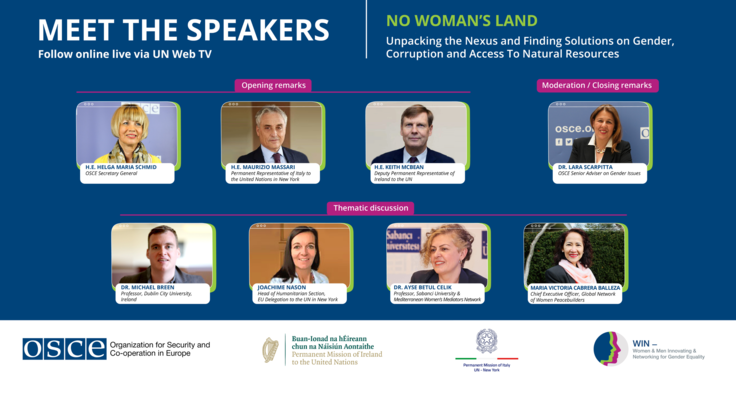-
Our work
-
Fields of work
- Arms control
- Border management
- Combating trafficking in human beings
- Conflict prevention and resolution
- Countering terrorism
- Cyber/ICT Security
- Democratization
- Economic activities
- Education
- Elections
- Environmental activities
- Gender equality
- Good governance
- Human rights
- Media freedom and development
- Migration
- National minority issues
- Policing
- Reform and co-operation in the security sector
- Roma and Sinti
- Rule of law
- Tolerance and non-discrimination
- Youth
- Field operations
- Projects
-
Meetings and conferences
- Summit meetings
- Review Conferences
- Ministerial Council meetings
- Plenary meetings of the Permanent Council
- Plenary Meetings of the Forum for Security Co-operation
- Security Review Conferences
- Annual Implementation Assessment Meetings
- Economic and Environmental Forum
- Economic and Environmental Dimension Implementation Meetings
- Human rights meetings
- Media conferences
- Cyber/ICT security conferences
- Conference of the Alliance against Trafficking in Persons
- Gender equality conferences
- Annual OSCE Mediterranean conferences
- Annual OSCE Asian conferences
- Partnerships
-
Fields of work
-
Countries
- All
-
Participating States
- Albania
- Andorra
- Armenia
- Austria
- Azerbaijan
- Belgium
- Belarus
- Bosnia and Herzegovina
- Bulgaria
- Canada
- Croatia
- Cyprus
- Czechia
- Denmark
- Estonia
- Finland – OSCE Chairpersonship 2025
- France
- Georgia
- Germany
- Greece
- Holy See
- Hungary
- Iceland
- Ireland
- Italy
- Kazakhstan
- Kyrgyzstan
- Latvia
- Liechtenstein
- Lithuania
- Luxembourg
- Malta
- Moldova
- Monaco
- Mongolia
- Montenegro
- The Netherlands
- North Macedonia
- Norway
- Poland
- Portugal
- Romania
- Russian Federation
- San Marino
- Serbia
- Slovakia
- Slovenia
- Spain
- Sweden
- Switzerland
- Tajikistan
- Türkiye
- Turkmenistan
- Ukraine
- United Kingdom
- United States of America
- Uzbekistan
- Asian Partners for Co-operation
- Mediterranean Partners for Co-operation
-
Structures and institutions
- Chairpersonship
-
Secretariat
- Secretary General
- Office of the Secretary General
- Conflict Prevention Centre
- Transnational Threats Department
- Office of the Special Representative and Co-ordinator for Combating Trafficking in Human Beings
- Office of the Co-ordinator of OSCE Economic and Environmental Activities
- Gender Issues Programme
- Opportunities for Youth
- Department of Human Resources
- Department of Management and Finance
- Office of Internal Oversight
- Documentation Centre in Prague
- Institutions
-
Field operations
- Presence in Albania
- Centre in Ashgabat
- Programme Office in Astana
- Programme Office in Bishkek
- Mission to Bosnia and Herzegovina
- Programme Office in Dushanbe
- Mission in Kosovo
- Mission to Moldova
- Mission to Montenegro
- Mission to Serbia
- Mission to Skopje
- Project Co-ordinator in Uzbekistan
- Closed field activities
- Parliamentary Assembly
- Court of Conciliation and Arbitration
- Organizational structure
- About us
No woman’s land: Unpacking the nexus and finding solutions on gender, corruption and access to natural resources
Conference
- Location:
- UNHQ, Conference Room 6 - General Assembly Building and online via UN Web TV
- Organized by:
- OSCE Secretariat/ Gender Issues Programme (GIP), WIN Project, Office of the Secretary General, Italy and Ireland
- Source:
- OSCE Secretariat
- Fields of work:
- Gender equality
About
[embed_block:un_stream_no_womens_land]
WHEN: 13 March 2024, 10:00 AM - 11:15 AM (GMT-5)/ 15:00 PM - 16:15 PM (CET)
Corruption has been recognised by OSCE participating States as a significant threat to security and stability, representing one of the major barriers to prosperity and sustainable development. Academic research has also highlighted that corruption is not gender neutral but affects women disproportionally and represents a major obstacle to women’s economic empowerment, increases the risk of violence and poverty and limits women’s access to public services as well as natural resources. As a result, a gender perspective is essential to address this phenomenon and ensure the elimination of barriers to women’s empowerment and full enjoyments of their rights.
Building on OSCE pioneering work on the nexus between gender and corruption, the OSCE Gender Issues Programme (GIP) under the WIN Project, in partnership with Italy and Ireland, organizes, on 13 March, the side event “No woman’s land? Unpacking the nexus and finding solutions on gender, corruption and access to natural resources”. at the 68th Commission on the Status of Women in New York. The event aims to shed light on the pervasive impact of corruption on women in their access to natural resources and will provide an understanding of the political, environmental, social, and economic ramifications of corruption in this sector.
During the event, representatives of government, academia and international institutions, as well as members of the civil society will discuss the nexus between gender, corruption and access to natural resources including in the context of humanitarian settings and how policy-makers can promote gender-responsive policies and approaches.
Lastly, the CSW68 side event will serve as an opportunity to discuss the recommendations and the key highlights from the latest OSCE research “Gender and corruption in the access to natural resources: Preliminary findings” in four selected sectors such as water, land, forestry and extractive industries.
